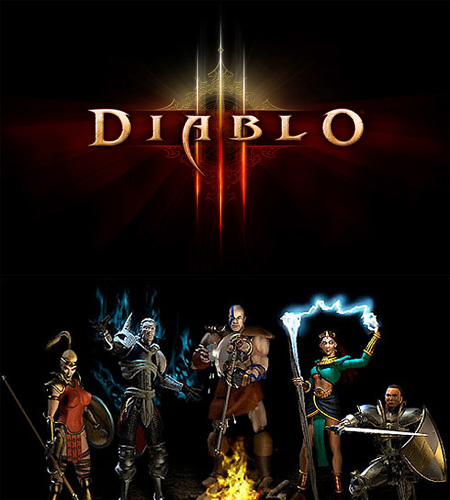
Future Fragments: Diablo III and Demon Slaying for Fun and Profit
Written by: Anastasia Salter, Pop-Culture Editor

Blizzard’s Diablo series has been heralded as one of the great game series of all time. But as more details are being leaked about the upcoming Diablo III, the identity of the series seems to be changing, reflecting a vision of the future of gaming that is at times alarming. Demon slaying has come a long way from the days of solo excursions down to the depths of hell–and the next generation might involve more profiteering than glory seeking. Will this sequel mark a move into a “real-world” integration of Diablo that will echo the pervasiveness of social gaming?
Recent announcements about Diablo III have revealed two major changes from past games: first, all play will take place online. The Internet must be active even to play alone. Single player was a big part of the original Diablo, and less so with each game since. Now, there’ll be no feeling of a private battle. The integrated Battle.net system offers friendship that extends across games, so that World of Warcraft friends will be able to message players in Diablo III and vice versa. While this isn’t a complete transition into the world of massive multiplayer, it’s definitely a social dynamic that feels more like Farmville than the original.
When Blizzard first brought their series to Battle.net, the problems of cheating grew with the player base. World of Warcraft brought a new dimension—the buying and selling of characters, equipment and gold. The second surprise in Diablo III will address that: the game will allow players to buy and sell their virtual loot for real money within the game’s own auction house. The idea of buying items for use in games as an official part of games was at first associated with the more sordid world of “free to play” but expensive to excel in or finish games. Social games based on the Facebook platform have been particular culprits. The move of this system as an integrated part of the hardcore gaming market isn’t new: but previous iterations have mostly kept the exchanges been between player and company.
The back and forth between designers trying to keep a hold on the reigns of their virtual economy and the capitalists trying to profit from their virtual industry has thus far been unresolved. It’s not surprising that Blizzard (or rather Activision) wants to find a way to profit off of the goldfarming and equipment auctioning that normally takes place on ebay and other sites outside the system. By charging only a small transaction fee, they can encourage players to stay within the system. (And if this is starting to sound like it all works in the company’s favor, there’s a reason for that.)
In Second Life, the economy has always involved an easy exchange back and forth between virtual “Linden dollars” and real money. But in Second Life, citizens use real talent to build their digital wares and sell their skills and services. It’s hard to imagine the same feeling of pride in selling what amounts to the clothes off a dead enemy’s back. Nor is there the same feeling of scarcity, as everything comes down to luck.
Diablo was always a game about gear: the original involved going deeper and deeper into the dungeons and caverns below a small town, continually returning to the center to get new loot evaluated and pick up cash. The better the gear, the better the demon slaying. But trading was part of the social world, even if selling gear on eBay is still profitable.
However, the acceptance of this sort of system marks another step towards a virtual and real economy that is all the more integrated, with questions on the horizon that still haven’t been answered as we navigate the new hybrid economy. Should trades in games be taxed? Will you report the “income” you earned in Diablo III to the tax authorities–and where you will list the location earned? Also, the announcements thus far One of the problems of goldfarming is inflation: virtual currency becomes worthless because of its perceived value. As people are drawn in by the potential of making money through what now is authorized goldfarming, it changes the game, and not just for the rising professional class. Perhaps the most dismal outcome could be a loss of a sense of play for some, as the potential fiscal successes replace other motivators and change the game to something akin to a slot machine in which rare loot drops are the winning prize. And for those not lured in by those prizes, what will it mean to be in the same space as professional game players?
We’re not yet at the point where “demon slayer” seems like a reasonable explanation to fill a gap between jobs on a resume. But the results of Diablo III’s system will have wide-ranging consequences for the hardcore and social game industries alike.
